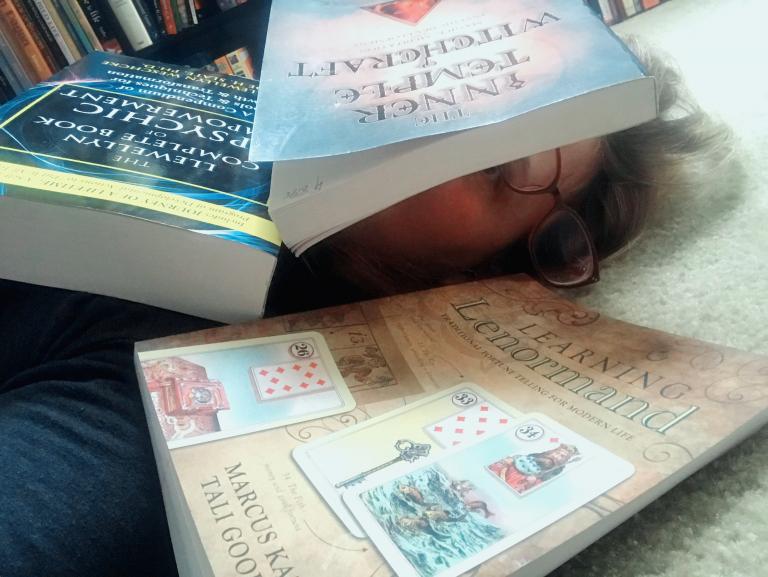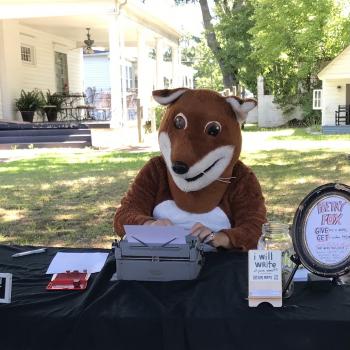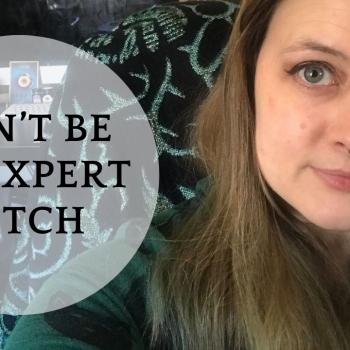 There are tons of articles floating around about how to choose good beginner books, how to find reputable teachers, how to join friendly covens, and how to find fun and educational public events, but in all this conversation we’re missing something that’s just as important as the ability to choose good resources: how to be a good beginner!
There are tons of articles floating around about how to choose good beginner books, how to find reputable teachers, how to join friendly covens, and how to find fun and educational public events, but in all this conversation we’re missing something that’s just as important as the ability to choose good resources: how to be a good beginner!
We’re living in a moment—and I’m turning into my father as I say this—where a lot of people want things done for them. It’s not really our fault (I’m including myself in this, because let’s be real, my father was talking to me, too). Culturally, we’ve become accustomed to being able to just Google answers, to download an app for whatever our problem is, and to receive twenty-four hour customer service, whatever sort of customer we are. My high schoolers learned in elementary school how the EOC and EOG state exams are curved in North Carolina (spoiler: you can fail and still pass) and the result for many of them is that they fill in their name bubbles and then go to sleep at their desks. As frustrated as I get, I don’t really blame them. We adults have conditioned this response, after all. (More spoilers: they’ll still get into college as long as they can pay, because the standards aren’t much different at many universities.)
I see similar patterns in many of the spaces occupied by beginners in Pagan and witch communities. People don’t want to read multiple books, they want to read one perfect one. Lots of people don’t even want to do that: why read a book when you can just DM an author and ask them to explain what witchcraft is? Even using Google is too much to ask. When the going gets tough, the tough abandon ship and then complain that there aren’t any good resources available.
Beyond books, this applies to my own experiences with inquiries to my coven. These days, my group’s exclusivity has less to do with our tradition and more to do with the reality that people are just less willing to travel more than fifteen miles, to compromise their personal schedules, or to do the work they’ve asked for (reading, contemplating, working ritual, attending coven meetings, etc.). I want to be clear: there’s a very important conversation here about inclusivity and ableism that’s ongoing in many magical communities (including my own coven), but I’m not talking about people who need consideration. I’m talking about people who are just entitled and lazy, or at least unaccustomed to putting forth the individual effort required for anything beyond mediocrity (who then complain as though the fault for their mediocrity lies elsewhere). Every school and workplace has at least a few of these, and so does every Pagan and witch community, it turns out.
How do you not become one of these people? Well, the good news is that if you’re worried about it, you almost surely aren’t. But just in case:
1.Read everything, regardless of what the Internet says. Go to a library, use interlibrary loan (some libraries will even mail things directly to your home!), and get your hands on as much text as possible. Then actually read and think about the material critically. No book is perfect. No author knows everything, no matter how solid their bio sounds or how many social media followers they have (or how many other books they’ve published!). We all suck somewhere. Note where, then fill in those holes with other texts. Do some comparison! Does this text largely agree with other texts on the same subject? If they’re saying something bananas, look for confirmation elsewhere! And remember that just because something is repeated often, that doesn’t mean it’s accurate. If you read with a critical eye, you cannot be “ruined” by a bad book. This idea is everywhere on the Internet, and it’s moronic. If you can get your head around the idea that sometimes non-fiction books contain erroneous material, and that it’s okay to read a book and disagree with its contents, you will be fine.
2. Ask better questions. My ninth grade geometry teacher was a grizzled ex-Navy SEAL, and he told us on the first day–to my terror and in no uncertain terms–that there were, in fact, stupid questions, despite what our kindergarten teachers and mommies had told us. I’m barely paraphrasing. I try to be more generous than Mr. O’Keefe, but at least this much is true: some questions are better than others. A while ago, I wrote a blog that mentioned the failing utility of the question, “Is this book any good,” but there are others I’ll address here.
Broad questions and questions that reveal you haven’t done any legwork on your own are the main culprits. The one that plagues my inbox personally is, “What’s a traditional Wiccan?” Here’s why that question is frustrating: first, I literally wrote a book about what that means. I run a website about it. I write a blog about it and make videos about it. Most of these things are available for free. A ten second Google search will turn up, not only an answer to that question, but my answer to that question. I’m not going to spell it out again on Instagram, and most others won’t either (about whatever their pet thing is). That question is too broad, and it ends up getting deleted. If you can answer it with a Google search, do that first.
“But Thorn, you know Google isn’t always reliable! How can you tell people to rely on Google?” Thanks for pointing that out—yes, you’re correct. And I’m not. We’ll use the unreliability of Google to craft better questions. Like so: “I read x on Google about traditional Wicca. Is x true?” This is a much better question. It’s more specific, and it demonstrates you’ve put forth an effort. It requires less time to answer, and is therefore more likely to receive a response. This isn’t just me being weird and picky, this is true for most people who find themselves in the position of answering questions (see, Steve O’Keefe). Here’s another good one: “What does traditional Wicca mean to you?” A very similar question, but with the nuance that you understand you’re talking to one person and that mileage will vary. You can improve practically any question with some variation on, “But what do you think?”
If you learn to ask more specific, thoughtful questions, you will get better answers. If you find that your questions consistently get unsatisfying answers, try asking different questions.
3. Get uncomfortable. I’m not saying throw out your personal boundaries or disregard your safety, but any time you’re doing something new you’re going to be dealing with a learning curve. You’ll hit a wall at some point and progress will get slow. It’ll happen; I promise. And it can suck if you’re not expecting it. Sometimes the wall is running out of low-hanging fruit and suddenly having to seek out more advanced material, or new people who can guide you. Sometimes the wall is conflicts with other parts of your life (religion has a way of forcing you to examine yourself and your previously held ideas), which you can either ignore or work through. Ignoring inconsistencies, conflicts, or other uncomfortable places will result in the wall not moving, and in no progress happening either way. You’ll sit right where you are. When you choose to work through something, you may still decide that the thing is wrong, irresolvable, or worth walking away over, but at least you’ll come by those conclusion honestly and on your own terms. When things become difficult, keep going. That’s usually means you’re making progress.
4. Be okay with being a beginner. In fact, rejoice in it. You know what I find exhausting? Social media accounts and blogs run by beginners that purport to be resources for others, when really they’re just plagiarized from books or other websites. Everyone wants to set themselves up as an expert as quickly as possible, but, frankly, beginners have the sweetest gig and I envy them a lot of the time. Aside from things being exciting and new, there are resources everywhere, lots of people who want to help you, and every damn day can feel like a discovery of something magical. There’s nothing sillier than watching beginners fight online over who’s right, what’s authoritative, what terms really mean, or who’s an insider and who’s an outsider. You just got here! No one expects you to have answers to everything (and a lot of those things don’t have answers). Enjoy the learning process, and take advantage of this time where people expect you to not know. Don’t try to bullshit people, have some modesty, be kind, and do more listening than talking. And if you do want to be a resource, you know what I’d personally love to see? A blog called WTF is All This: A Beginner Discovering Witchcraft. It would be full of doubts, failed experiments, the joy of finally realizing success, questions, and fresh perspectives, and zero reposting. I would read the shit out of that blog, and so would lots of other people. Send me the link when you set it up.
5. Take action. Reading and hoarding information is all well and good, but you have to do something with it. It’s true that witchcraft and magic are serious arts, and it’s also true that you can do foolish things and get hurt along the way. Buuuuuut…you probably won’t at this stage. Let’s be real: someone who just read their first book and has never worked ritual magic is disproportionately unlikely to successfully invoke something genuinely harmful or to successfully pull off a working that is truly destructive. More than likely, nothing at all will happen, except for whatever internal emotional experience results. Witchcraft isn’t skydiving. A beginner and an expert skydiver both jump out of a plane, and they both have to equally deal with the fact that they’re falling. In magic, however, things don’t work just because you say the words and do the motions. You’re not just jumping and falling. There’s effort, intention, connection, and skill behind it. Those things develop in time, with work. For most people, success rates increase with time and practice. So start! I’ve found that the longer people wait, the more freaked out they get and the less likely they are to actually try anything. So pick a thing and try it. You’re going to screw it up somewhere—we all do—so put the book down and give it a shot!
6. Don’t hang your hat on any one teacher, and don’t pick a hill to die on. I have my favorite writers and teachers, as well as religious narratives, traditions, and perspectives that are dear to me. However, I try not to model my practice after any one of those exclusively. Witchcraft isn’t a cult of personality (though as a community, we do try), and it’s also not static. Don’t pin yourself to any one person or perspective, especially in an era when so many of our heroes and ideas seem to be made of straw. Community leaders are ousted, change their minds, convert, retract their positions, and are human just like everyone else. At the very least, they’re going to die eventually. If your practice is all about someone else, where will you be when that person isn’t there anymore? The same is true for ideas. Witches who began practicing in the sixties and seventies (and earlier) had to watch while their understanding of history was ruthlessly dismantled by scholars in the nineties and later. Witches who began their practice before social media had to readjust with the development of the Internet, and all of the changes that brought. In the last decade, some of our most cherished teachers have revealed themselves to be bigots, sex-offenders, and plenty else besides. Life gets messy and history keeps moving, without much care for your feelings. Explore, be open, and don’t cling too hard to any one person or perspective. You have to keep enough distance so that when it’s time to let something go, you can.
7. Do the work you say you want. If you say you want to be psychic, and every book and teacher out there says similar, core things about how to develop your psychic abilities, and you don’t do them because they’re time consuming or difficult, you don’t then get to complain about not progressing as a psychic. I went to college for music, where I was instantly surrounded by musicians who could wipe the floor with me. Why? It’s not a mystery: they practiced more. In order to compete, I had to change my game plan, but there was no shortcut. I didn’t take a life-altering class, hear some inspiring late-night words from a trusted mentor, or learn some magical technique that gave me perfect pitch. I literally just practiced more, and learned to do so more effectively. It took time and work, and sometimes it was awful. But it worked! I got better (though there was still plenty of floor wiping, rest assured). Magic, spiritual development, witchcraft, tarot reading, group leadership, and pretty much anything else worthwhile you can name requires actual work. That means time, commitment, effort, reflection, and repeated failure (after which you get up and try again). If you want to do the thing, and especially if you ask for help to do the thing, then you have to actually do that work that you said you wanted to do. Buying a book is not the same thing as reading a book, and it’s definitely not the same thing as doing the exercises in the book. So how badly do you want it? Prove it. (PS, if you want to be psychic, here you go.)
Obviously this list isn’t comprehensive, and any one of these could have been its own article, but I hope this at least serves as a guidepost for folks our there who are hitting some walls, not getting the support they need, or are otherwise just not where they want to be. Being a student actually entails a definitive skillset. It’s why we teach high school children how to study instead of just giving them an exam and telling them to have at it while hoping for the best (well, at least it’s why we should). You can be good at learning, at getting people to answer your questions and help you, and at evaluating what you learn more efficiently.
















